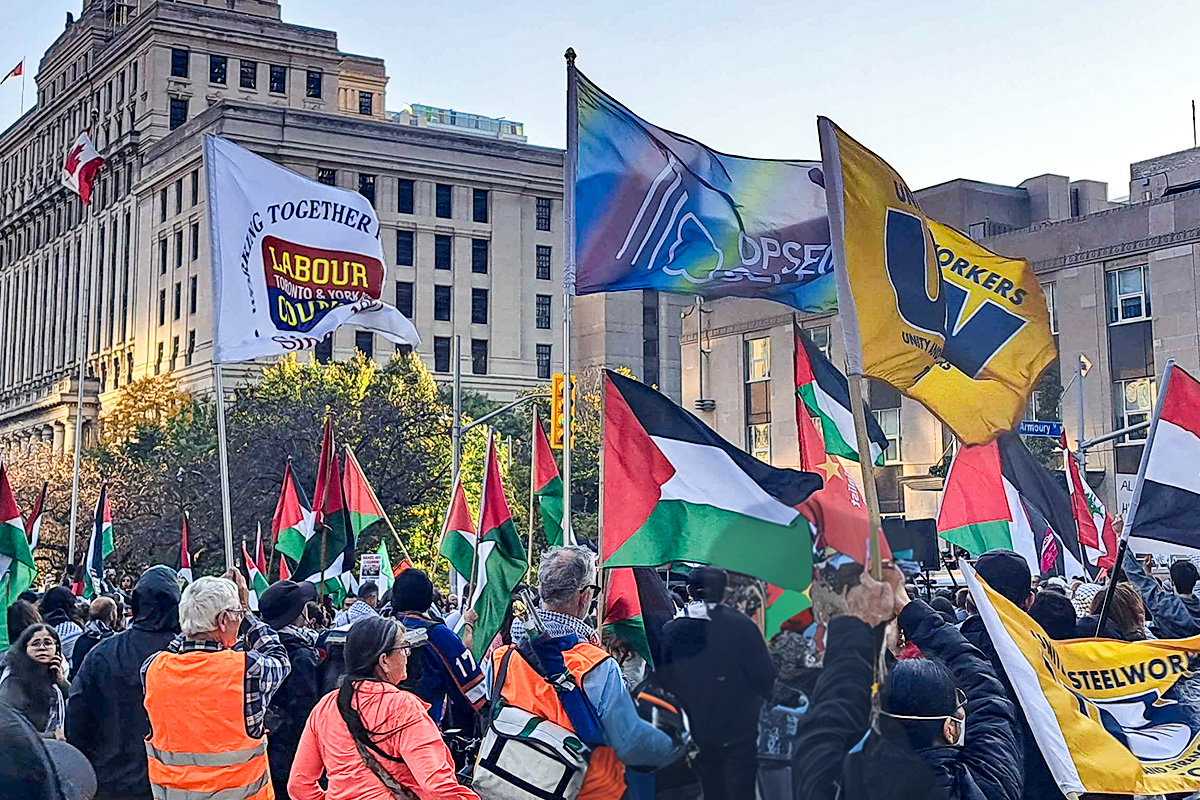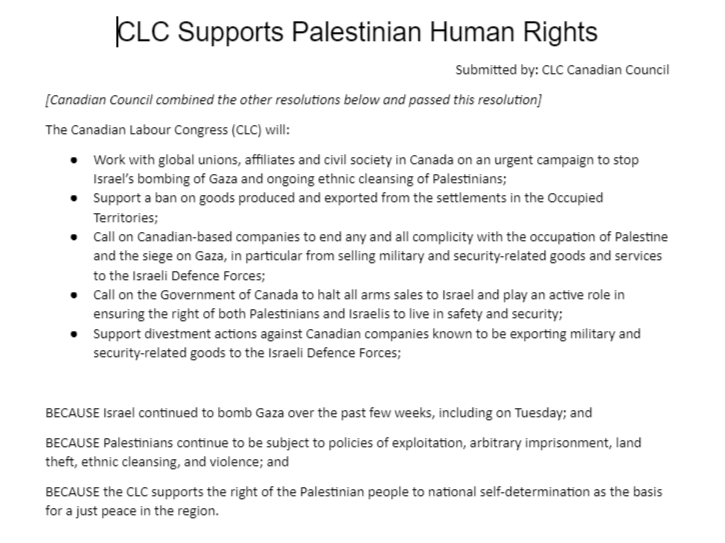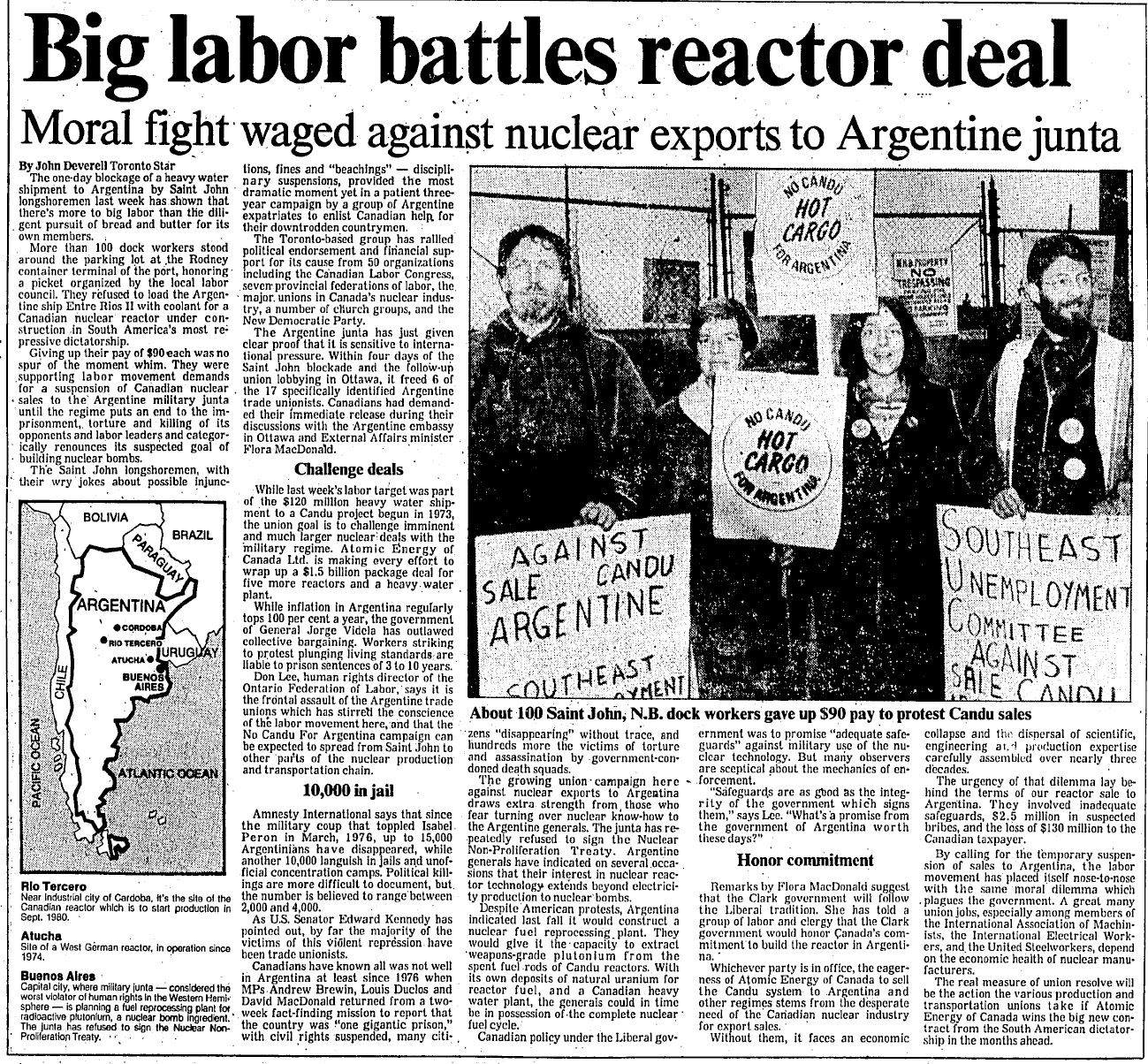
For over a year, Netanyahu has been given a free hand to murder tens of thousands of people in Gaza and Rafah with Canadian-made mortars, tank and jet parts, and radar systems. And, the killing is extending into Lebanon, Syria, Yemen, and Iran—with Canada’s help.
With the region on the edge of war, the labour movement must oppose the Zionist rampage with action.
Defend the right to oppose genocide
Since last fall, millions have taken to the streets to oppose Netanyahu’s war on the Middle East—in the face of slander, mass arrests and police brutality. To their credit, most unions in Canada and Quebec have participated in the movement. Many of them have mobilized for pro-Palestine demonstrations, they have condemned Canada’s arms shipments to Israel, and called for an end to the siege.
And, several unions have passed or co-signed resolutions vowing to mobilize further.
Back in 2021, the Canadian Labour Congress adopted an emergency motion to mobilize against Canada’s complicity in the ethnic cleansing of Palestine.

Last autumn, a petition signed by CUPE, Confédération des syndicats nationaux (CSN), Unifor, the United Steelworkers and the Canadian Union of Postal Workers, further pledged that:
“Our most urgent task is preventing the further loss of life and an even greater humanitarian disaster than what we have already witnessed in Gaza. An all-out war would bring catastrophe to the entire region.”
But now, a regional war is approaching. And Canadian companies continue to arm Israel’s carnage.
Canada’s government has ignored our unions’ words. It has not blocked Sudbury nickel from providing crucial material for Israeli bullets. Nor has it stopped automakers like Ford and General Motors from supplying vehicle parts to the Israeli military. Shipping routes from Vancouver, Delta, Prince Rupert, St John and Montreal continue to move cargo for companies like Zim and Maersk, to Israel. And, quietly, the government has permitted arms dealers like Lockheed Martin, Raytheon and other weapons makers to assist Israel’s war machine, via the United States.
In many cases, this draws union members—miners, port workers, autoworkers and others—into the Israeli military’s supply chain. This obviously contradicts their unions’ commitments to international solidarity. But it also contradicts these unions’ democratically-agreed mandates.
Blockade all support for the Israeli war machine
When workers go on strike, all union members are expected to respect their picket lines. Typically, that means refusing to handle or process any material that is made by scabs or which otherwise seeks to replace striking workers.
This scab material is traditionally labeled “hot cargo.” This is understood to be more than a practical agreement. It is, fundamentally, about defending workers’ democratic right to organize, to say no to hazardous and unsafe work, and to fight for improvements.
In like manner, the CLC’s three million members and most of Quebec’s unions have voted for resolutions opposing Canada’s complicity in genocide. They have voted to fight Canada’s complicity in the Israeli war machine—in the form of arms shipments, diplomatic coverage and the like.
It follows that the CLC, the CSN and the labour movement must ensure that no union member is tasked with moving weapons or other cargo that will assist in genocide or occupation.
This is about solidarity with the Palestinian people. But it is also about defending workers’ rights to determine their conditions of work. They have voted to break from the Zionist war machine that is terrorizing workers and the poor in Palestine, Lebanon, Syria and Iran. And, this vote must be defended.
Fighting imperialist slaughter in Latin America, East Timor and Palestine
The labour movement in Canada and Quebec has indeed used “hot cargo” edicts to oppose imperialist slaughter before.
A century ago, Canada’s imperialist intervention to strangle the Russian Revolution was further undermined by dockworkers and soldiers who refused to kill in the name of profit.
More recently, a 1979 strike by workers at the Port of St. John blocked shipments intended to aid Argentina’s CIA-backed military dictatorship. As part of Operation Condor—an anti-communist campaign of torture and murder across Latin America—Argentina’s generals were assisted by American guns, Israeli and French warplanes, and Canadian nuclear material.

With the death toll rising, the Canadian Labour Congress voted to block any material that would be used to aid Gen. Videla’s efforts to terrorize the workers of Latin America—even if that meant “stop[ping] every ship and plane bound for Argentina.”
This came to a head that July, when 100 dockworkers at the Port of St. John declared the $120 million CANDU nuclear shipment hot cargo—and blocked the port. Supported by the CLC, CUPE and other unions, the International Longshoremen’s Association stopped the shipment and demanded freedom for “disappeared” workers’ leaders.
Few members of ILA Local 273 had presumably been to Argentina. But the labour movement voted not to assist the Junta and it mobilized to carry that vote out, in practice. And, they won. The unions helped secure the release of several jailed trade union leaders and halted the shipment.
In 1999, the Canadian Labour Congress imposed a similar “hot cargo” edict on material bound for Indonesia, in opposition to its Western-backed genocide in East Timor.
Like the United States, the Canadian government backed Suharto’s dictatorship for decades, praising him as a “moderate, sensible and progressive leader” working to “stabilize” Asia. While Suharto terrorized East Timor, under names like “operation extinction”, for decades, Canada provided millions of dollars worth of weapons, ranging from bullets to tank parts.
After years of protesting, the Canadian Labour Congress voted to block further material aid to Indonesia, in 1999 until Suharto withdrew.
Immediately, the CLC announced that the International Longshore and Warehouse Union, the Canadian Union of Postal Workers and the Canadian Auto Workers refused to move any and all goods to or from Indonesia. And, the CLC press release stated: “Other CLC affiliates representing workers in transportation and communications are also investigating what steps they can take to affect the flow of goods to and from Indonesia.”
At the local level, unions have imposed “hot cargo” edicts to back up their commitments to international solidarity too.
In 1984, International Longshore and Warehouse Union (ILWU) Locals 10 and 34 refused to unload South African cargo in San Francisco, in keeping with its longstanding opposition to the apartheid regime.
And, dock workers in Genoa and Barcelona refused to move weapons bound for Israel last fall.
These provide examples of what can be done.
Ultimately, it was the workers of Indonesia, Argentina and South Africa themselves who swept away their NATO-backed dictators. And it will be the working class of the Middle East and North Africa which sweeps away Netanyahu.
Nevertheless, these acts of solidarity materially aid the fight for liberation. They stop the movement of material that aids genocide, they provide a rallying point for organizing and they defend workers’ rights to say no to mass murder.
It was and remains vital that the labour movement in Canada revives this tradition and stands in solidarity with the workers and the poor who are oppressed by our ruling class, internationally.
That starts by pledging to defend any worker who refuses to handle cargo that will likely aid the Israeli war machine, as it terrorizes the Middle East and North Africa. And, from there, the CSN, the CLC and their affiliates must develop a plan of escalation.
The best way to pressure companies and the Canadian government into honoring the CLC’s democratic mandate and divest from the Israeli war machine is to refuse to assist that war machine in our workplaces.
This could also provide an opportunity to expand the Palestine solidarity movement and the labour movement, generally. Any worker who wants to fight to break their workplace’s ties to slaughter overseas should be welcomed into the ranks of the CLC, the CSN and their affiliates. Areas like Malton and Mississauga, for example, are key logistics hubs for companies like Maersk. They also have large immigrant and Palestinian refugee populations that have been neglected by the labour movement for too long. This could provide an opportunity for the labour movement to win their confidence in struggle.
At bottom, the labour movement exists to fight for workers’ power. Unions were created as organs of struggle because, under capitalism, we do not control our conditions of work or our conditions of life. When we are isolated and unorganized, the ruling class is given a free hand to slash our wages, speed up our work, lay us off, discriminate against us and divide us in the name of profit. The same system empowers the same ruling class to terrorize workers and the poor overseas.
Same struggle, same fight.

